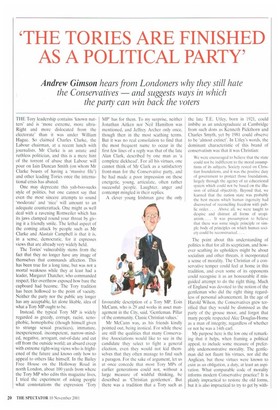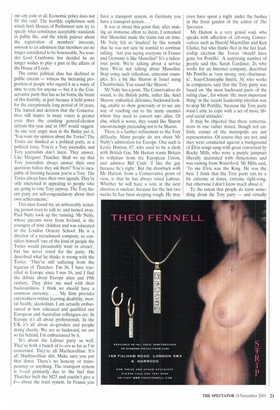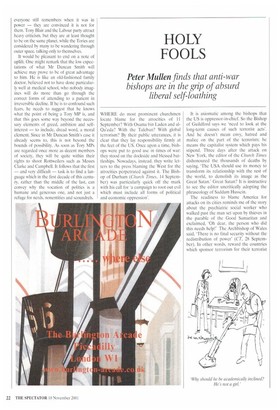'THE TORIES ARE FINISHED AS A POLITICAL PARTY'
Andrew Gimson hears from Londoners why they still hate
the Conservatives — and suggests ways in which the party can win back the voters
THE Tory leadership contains 'known nutters' and is 'more extreme, more ultraRight and more dislocated from the electorate' than it was under William Hague. So claimed Charles Clarke, the Labour chairman, at a recent lunch with journalists. Mr Clarke is an astute and ruthless politician, and this is a mere hint of the torrent of abuse that Labour will pour on fain Duncan Smith (on whom Mr Clarke boasts of having a 'massive file') and other leading Tories once the international crisis has abated.
One may deprecate this yah-boo-sucks style of politics, but one cannot say that even the most sincere attempts to sound 'moderate' and 'nice' will amount to an adequate counterattack. One might as well deal with a ravening Rottweiler which has its jaws clamped round your throat by giving it a friendly smile. The lethal aspect of the coming attack by people such as Mr Clarke and Alastair Campbell is that it is, in a sense, democratic, for it expresses views that are already very widely held.
The Tories' vulnerability stems from the fact that they no longer have any image of themselves that commands affection. This has been true for a long time, but was not a mortal weakness while they at least had a leader, Margaret Thatcher, who commanded respect. Her overthrow exposed how bare the cupboard had become. The Tory tradition has been hollowed to the point of vacuity. Neither the party nor the public any longer has any acceptable, let alone likable, idea of what a Tory MP ought to be.
Instead, the typical Tory MP is widely regarded as greedy, corrupt, racist, xenophobic, homophobic (though himself given to strange sexual practices), immature, inexperienced, incompetent, narrow-minded, negative, arrogant, out-of-date and cut off from the outside world; an absurd creep with extreme right-wing views who is frightened of the future and knows only how to appeal to others like himself. In the Bailey Free House on the Holloway Road in north London, about 100 yards from where the Tory MP who edits this magazine lives, I tried the experiment of asking people what connotations the expression `Tory MP' has for them. To my surprise, neither Jonathan Aitken nor Neil Hamilton was mentioned, and Jeffrey Archer only once, though then in the most scathing terms. But it was no real consolation to find that the most frequent name to occur in the first few lines of a reply was that of the late Alan Clark, described by one man as 'a complete dickhead'. For all his virtues, one cannot think of Mr Clark as a satisfactory front-man for the Conservative party, and he had made a poor impression on these energetic, young, articulate, often rather successful people. Laughter, anger and contempt mingled in their replies.
A clever young Irishman gave the only
favourable description of a Tory MP. Eoin McCann, who is 29 and works in asset management in the City, said. 'Gentleman. Pillar of the community. Classic Christian values.'
Mr McCann was, as his friends kindly pointed out, being ironical. For while these are still the qualities that many Conservative Associations would like to see in the candidate they select to fight a general election, even they would not kid themselves that they often manage to find such a paragon. For the sake of argument, let us at once concede that most Tory MPs of earlier generations could not, without a large measure of wishful thinking, be described as 'Christian gentlemen'. But there was a tradition that a Tory such as the late T.E. Utley, born in 1921, could imbibe as an undergraduate at Cambridge from such dons as Kenneth Pickthorn and Charles Smyth, yet by 1981 could observe to be 'almost extinct'. In Utley's words, the dominant characteristic of this brand of conservatism was that it was Christian:
We were encouraged to believe that the state could not he indifferent to the moral assumptions of its subjects. Society rested on Christian foundations, and it was the positive duty of government to protect those foundations, largely through the agency of an educational system which could not be based on the illusion of ethical objectivity. Beyond that, we learned that the nation state was probably the best means which human ingenuity had discovered of reconciling freedom with public order.... Above all, we were taught to despise and distrust all forms of utopianism.... It was presumption to believe that there was some single principle or simple body of principles on which human society could be reconstructed....
The point about this understanding of politics is that for all its scepticism, and however scathing its upholders might be about socialism and other threats, it incorporated a sense of morality. The Christian of a conservative temper could feel at home in this tradition, and even some of its opponents could recognise it as an honourable if misguided attempt to do the right thing. Much of England was devoted to the notion of the gentleman who did the right thing regardless of personal advancement. In the age of Harold Wilson, the Conservatives grew terrified that they would be dismissed as the party of the grouse moor, and forgot that many people respected Alec Douglas-Home as a man of integrity, regardless of whether or not he was a 14th earl.
My purpose here is the low one of remarking that it helps, when framing a political appeal, to include some measure of preferably undemonstrative morality. The gentleman did not flaunt his virtues, nor did the Anglican, but those virtues were known to exist as an obligation, a duty, at least an aspiration. What comparable code of morality informs modern Conservative practice? It is plainly impractical to restore the old forms, but it is also impractical to try to get by with Out any code at all. Economic policy does not fill this void. The homble explicitness with which both Houses of Parliament now try to specify what constitutes acceptable standards in public life, and the whole palaver about the registration of members' interests, amount to an admission that members are no longer considered to be honourable. No wonder Lord Cranborne has decided he no longer wishes to play a part in the affairs of the House of Lords.
The entire political class has declined in public esteem — witness the increasing proportion of people who regard it as a waste of time to vote for anyone — but it is the Conservative party that has so far borne the brunt of this hostility, in part because it held power for the exceptionally long period of 18 years. The hatred and derision that the Conservatives still inspire in many voters is greater even than the crushing general-election defeats this year and in 1997 would suggest. As one very angry man in the Bailey put it, 'You want my opinion about the Tories? The Tories are finished as a political party, as a political force. You're a Tory journalist, and Tory journalists don't listen. They answer. Like Margaret Thatcher. Shall we say that Tory journalists always answer their own questions before they ask them? You're incapable of listening because you're a Tory. The Tories always have their own agenda. They're only interested in appealing to people who are going to vote Tory anyway. The Tory fascist party are self-congratulatory about their own achievements.'
This man found me an unbearably irritating person even to talk to, and turned away. Paul Nulty took up the running. Mr Nulty, whose parents were from Ireland, is the youngest of nine children and was educated at the London Oratory School. He is a director of a recruitment company, so considers himself 'one of the kind of people the Tories would presumably want to attract', but has never voted for the party. He described what he thinks is wrong with the Tories: 'They're still suffering from the legacies of Thatcher. I'm 36, I have travelled in Europe since I was 16, and I find the debate about Europe alien and 19th century. They drive me mad with their backwardness. I think we should have a common currency. . . . My firm provides careworkers within learning disability, mental health, alcoholism. I am actually embarrassed at how educated and qualified our European and Australian colleagues are. In Europe its all about professionals. In the UK it's all about do-gooders and people doing charity. We are so backward, we are so far behind, I'm embarrassed by it.
'It's about the Labour party as well. They're both a bunch of f—ers as far as I'm concerned. They're all Machiavellian. It's all Machiavellian shit. Make sure you put that down. There's no honesty or transparency or anything. The transport system is f—ed primarily due to the fact that Thatcher built the M25 and couldn't give a f— about the train system. In France you have a transport system, in Germany you have a transport system...
It was at about this point that, after making an immense effort to listen, I remarked that Mussolini made the trains run on time. Mr Nulty felt so 'insulted' by this remark that he was not sure he wanted to continue talking. 'Are you saying everyone in France and Germany is like Mussolini? It's a ridiculous point. We're talking about a service here. We're not talking about Mussolini. Stop using such ridiculous, extremist examples. It's a bit like Sharon in Israel using Chamberlain. You sound like Sharon.'
Mr Nulty has a point. The Conservatives do sound, to the British public, rather like Ariel Sharon: embattled, defensive, backward-looking, unable to show generosity or to see any way of reaching out to the many enemies whom they need to convert into allies. Or else, which is worse, they sound like Sharon unconvincingly pretending not to be Sharon.
There is a further refinement to the Tory difficulty. Many people do not share Mr Nulty's admiration for Europe. One such is Leslie Hutton, 67, who used to be a clerk with British Gas. Mr Hutton wants Britain to withdraw from the European Union, and admires Bill Cash: 'I like the guy because he's right.' But the drawback with Mr Hutton, from a Conservative point of view, is that he has always voted Labour. Whether he will have a vote at the next election is unclear, because for the last two weeks he has been sleeping rough. He may
even have spent a night under the bushes in the front garden of the editor of The Spectator.
Mr Hutton is a very genial soul, who speaks with affection of left-wing Conservatives such as Harold Macmillan and Ken Clarke, but who thinks that in the last leadership election the Tories 'should have gone for Portillo'. A surprising number of people said this. Sarah Gardiner, 26, who works for an Internet company, described Mr Portillo as 'very strong, very charismatic'. Jean-Christophe Smith, 30, who works in computers, said that the Tory party was based on 'the most backward parts of the ruling class', for whom 'the most important thing' in the recent leadership election was to stop Mr Portillo, 'because the Tory party wasn't able to cope with a set of more liberal social attitudes'.
It may be objected that these conversations in one rather mixed, though not unIrish, corner of the metropolis are not representative. Of course they are not, and they were conducted against a background of Elvis songs sung with great conviction by Rocky Mills, who wore a purple jumpsuit liberally decorated with rhinestones and was visiting from Waterford. Mr Mills said, 'To me Elvis was the King. He was the best. I think that the Tory party can be a bit extreme at times, extreme right-wing, but otherwise I don't know much about it.'
To the extent that people do know something about the Tory party — and virtually everyone still remembers when it was in power — they are convinced it is not for them. Tony Blair and the Labour party attract heavy criticism, but they are at least thought to be on the same planet, while the Tories are considered by many to be wandering through outer space, talking only to themselves.
It would be pleasant to end on a note of uplift. One might remark that the low expectations of what Mr Duncan Smith will achieve may prove to be of great advantage to him. He is like an old-fashioned family doctor, believed not to have done particularly well at medical school, who nobody imagines will do more than go through the correct forms of attending to a patient in irreversible decline. If he is to confound such fears, he needs to suggest that he knows what the point of being a Tory MP is, and that this goes some way beyond the necessaty elements of greed, ambition and selfinterest — to include, dread word, a moral element. Since in Mr Duncan Smith's case it already seems to, this is not beyond the bounds of possibility. As soon as Tory MPs are regarded once more as decent members of society, they will be quite within their rights to shoot Rottweilers such as Messrs Clarke and Campbell. It follows that the first — and very difficult — task is to find a language which in the first decade of this century, rather than the middle of the last, can convey why the vocation of politics is a humane and generous one, and not just a refuge for nerds, nonentities and scoundrels.
















































































































 Previous page
Previous page